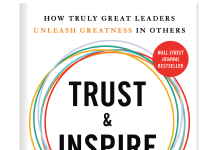
Are your team members so petrified they might fail that they limit their possibility of success?
Or maybe you have your own trepidations about failure.
If so, it’s time to adjust your mindset and embrace failure as the birthplace of success. If there is anything we should be learning in life, it is how to fail and fail as often as needed.
Embracing Failure
Of course, that’s not the way most of us approach things. From our earliest school days, we view failing as the worst possible outcome, a fate to avoid at all costs. That continues in the working world, where bosses often have little patience with failure, and potential entrepreneurs are hesitant to launch their businesses because they know failing is a distinct possibility.
The result is often a life of mediocrity because the simplest way to avoid failing is to take few risks or, worse, no risks. That is not the path you want to find yourself on, which is why I like to say that I believe in “failing,” although I don’t believe in “failure.” What’s the difference? I discuss this in more detail in my book, “A Love Affair with Failure: When Hitting Bottom Becomes a Launchpad to Success,” but let me sum it up here.
“Failure” represents a destination. It attempts to define you by informing you that your unfortunate experience limits how far you can go or how well you can do. But life is not static. Your destiny is still playing out. There are infinite possibilities for what you can become.
The Journey
“Failing” represents a journey. It is a sign of progress, a transition into something better. Failing is how modern civilization was built—a litany of failed attempts morphing into something better and greater at the prodding of thinkers and doers who were not afraid to take a chance.
Look around, and you will see that some of the most successful people in the world have something in common—somewhere along the way, they failed.
Steven Spielberg is an excellent example. As a teenager, he set his sights on attending one of the prestigious film schools at UCLA or USC, where he hoped to create the foundation for a future career as a movie director.
The admissions officers at those universities were unimpressed as they reviewed his records, which included poor academic performance in high school. They rejected him, forcing Spielberg to settle for a backup plan: enrolling at the less impressive California State University at Long Beach.
It wasn’t his first choice, but at least now he was on the path to success, right? Not at all. Spielberg dropped out without finishing his degree. His failures were starting to stack up. How bright could his future be?
Pretty bright, as it turned out. He didn’t let those early setbacks stop him, and by age 26, with a few TV and movie directing credits already under his belt, Spielberg was directing one of the greatest summer blockbuster films ever, Jaws.
4 Ways to Change Your Mindset
So if fear of failing is blocking you from success, here are four ways to begin changing your mindset:
- Accept that failure is common. As life progresses, most people will lose more time than they can bear. A coveted job offer won’t materialize. A product won’t sell as well as envisioned. You will find yourself questioning everything you have believed, even yourself. You will make mistakes. All of these things matter, and none of it does—not as much as how you react when everything crumbles, not as much as what you learn when it does and how you use it. Let’s look at another famous example. Bill Gates’ first startup, a company called Traf-O-Data, flopped. But one of Gates’ partners called the doomed venture a “favorite mistake because it confirmed that every failure contains the seeds of your next success.”
- Embrace the opportunity for self-discovery. Hardships will teach you about yourself because they serve as portals of personal discovery. It matters who you are. It matters why you want to succeed. To understand your motivations, limitations, and strengths is to be truly resilient.
- Remember that failure is not permanent. Think of failing as a detour that momentarily forces you off your desired route. The difficult periods on the road to your destination are not markers signifying the end. They might give you a bit of pause and make you reevaluate your position, but if you hold steady, you will make it through. And you will be in good company. Abraham Lincoln’s early political career was defined by relentless failing and difficulty, but he held steady and achieved greatness.
- Realize that perseverance does make a difference. Everyone knows the importance of perseverance, at least in theory. But knowing it and doing it are two different things. Don’t let the challenges of the present moment deter you. Keep going and keep going strong. This doesn’t mean plowing ahead alone, ignoring your fatigue. Reach out for help when necessary. Sit down and rest for a while if you need to. Take stock. Reassess. Then pick yourself up and keep going.
Finally, it’s important to remember that life was not designed for uninterrupted stretches of ease. All of us will have a lot more ordinary days and bad days than good ones. You will have days where you are scrapping and fighting to survive and days when nothing good or bad happens—just plain, simple, regular days.
Don’t despair. That makes the glory days, when they arrive, all the more rewarding.




